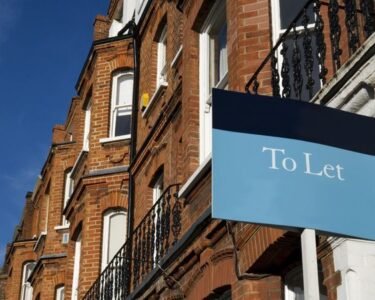The average house price in the UK has plummeted £22,000 in a month, according to the latest figures from the Office for National Statistics.
Today, the ONS said that the nation’s official average house price as £268,000 compared to the £290,000 figure it reported last month.
Mysteriously, the same ONS house price report said that house prices are up 4.6 per cent annually.
So, how can house prices take a nosedive and go up at the same time?
Rather than signifying one of the most aggressive property crashes in history, the ONS says this is merely down to a re-calculation in the way it assesses house prices – and what kind of property the ‘average home’ would be.

Don’t panic: house price fell £22,000 this month, according to official figures – but ONS says this is a re-calculation and not a crash
The ONS explains that it has shiifted its statistics to take into account the changing face of the property market and better reflect what the so-called average home is.
This involves a shift away from larger more expensive properties, hence the nudging down of the price attached to that average home.
The re-calculation is based on changing trends in the types of properties being sold between 2015 and 2023.
Over this period sales of smaller properties proportionately increased, according to the ONS. This means there were more sales of flats and maisonettes than of detached houses.
It also says that sales in more expensive parts of the Britain proportionately decreased. For example, there were was a greater proportion of sales in Scotland than in London.
This means that the average UK property sold in 2023 tends to be smaller, and in a cheaper part of the UK, than the ‘average’ UK property sold in 2015.
By updating the reference period from January 2015 to January 2023 this has reduced the weight of large, expensive property prices making up the overall average and has led to a 7.9 per cent drop in average values.
Kris Jenkins of the ONS said: ‘We had initially proposed to update this reference every five years.
‘However, this would have meant using a reference period in 2020, when the UK housing market was impacted by the COVID-19 pandemic, and led to changes in housing preferences.
‘Transactions during this time were atypical compared to usual trends. We took the decision to delay this update until the housing market returned to more normal times.
‘This re-referencing ensures the average price levels better reflect the types of properties currently being sold.
‘As our house price index approaches 10 years of production, we will continue to review the data sources and methods used to ensure we are accurately capturing the evolution of the housing market in the UK.’
So what does the ONS say is actually happening?
Based on the updated calculations, house prices rose by £12,000 on average in 2024, according to the latest report from the Office for National Statistics.
The average home in Britain was worth £268,000 as of December 2024, based on ONS estimates, which it says is 4.6 per cent higher than the previous year.
Jeremy Leaf, north London estate agent and a former Rics residential chairman, said: ‘This survey is the most comprehensive of all the market house-price indices, covering not just mortgaged properties but the 40 per cent or so of transactions which are arranged without finance.
‘It may be a little dated but shows that the housing market was considerably resilient at the end of last year. This is despite buyers and sellers coming to terms with the market realities of slower-than-previously-expected falls in borrowing costs.
‘Looking forward, we are not seeing or likely to see any great changes in pricing or renegotiation but with inflation edging upwards, the further rate cuts which would greatly assist activity and buyer and seller confidence may be delayed for now.’

Jeremy Leaf, north London estate agent and a former Royal Institution of Chartered Surveyors residential chairman
Across Britain it is fair to say prices are moving faster in some regions than others.
The average house price for Northern Ireland was £183,000 in the final three months of 2024, up 9 per cent year-on-year.
Over the course of last year, in England, average house prices increased to £291,000, up 4.3 per cent, in Wales prices rose by 3 per cent to £208,000, and in Scotland prices rose by 6.9 per cent to £189,000.
Within England there are some massive regional variations as well. The average home in the North East rose in value by 6.7 per cent while prices in Yorkshire and The Humber rose by 5.9 per cent last year.
At the other end of the spectrum, the average price in London has not changed over the past 12 months while prices in the South West have increased by 3.8 per cent.

Jonathan Hopper, chief executive of buying agent Garrington Property Finders said: ‘Not since the heady post-lockdown ‘race for space’ has the divergence between London prices and the rest of the UK been so stark.
‘Average property prices in the capital ended 2024 exactly where they began the year. Zero growth over the year as a whole, and we even saw London prices fall in November and December.
‘This is partly a whiplash effect from the tax rises announced in the Chancellor’s October Budget, which hit sentiment hard at the top end of the market.
‘Buyers in the capital have since become highly price-sensitive, and willing to negotiate hard on price or simply look elsewhere.’
While London prices are languishing Hopper notes that the brisk pace of price rises across Northern England continues to widen the North-South divide.
‘At the other end of the scale, the market dynamics in Scotland and Northern Ireland are seemingly detached from economic gravity,’ added Hopper.

Jonathan Hopper, chief executive of buying agents Garrington Property Finders
‘Two factors underpin their rapid price growth – soaring rent increases have nudged many tenants into buying their first home, and the relatively strong value offered in both nations compared to other parts of the UK has lured price-conscious buyers from elsewhere.
The property market is broadly in good health, according to Hopper who operates as a buying agent and therefore has no vested interest in house prices going up.
However, he believes that buyers often still hold all the cards at the negotiation table.
‘The number of homes for sale is so abundant in some areas – even in highly sought-after, prime postcodes – that buyers find themselves firmly in the driving seat and able to drive a hard bargain on price,’ said Hopper.
‘This is likely to keep future price rises modest in much of southern England, and anyone planning to put their home on the market there in the coming months will need to price it competitively to attract buyers.’
Some links in this article may be affiliate links. If you click on them we may earn a small commission. That helps us fund This Is Money, and keep it free to use. We do not write articles to promote products. We do not allow any commercial relationship to affect our editorial independence.




